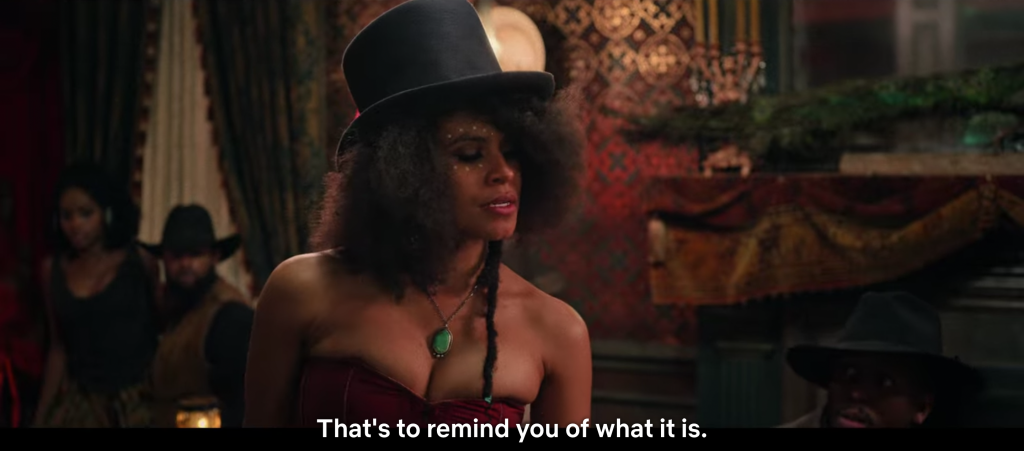The needle drops of Jeymes Samuel’s “The Harder They Fall” come fast and hard, with relish and with redundancy. A band of riders kick up dust across sprawling plains, en route to hijack a stagecoach, while the undulant vocalizations of a Samuel-remixed reggae track signify the obvious: “Whoa / Here I come”). “The Harder They Fall,” buoyed by an undercurrent of its filmmaker’s own recordings, is, tonally speaking, a bit operatic. The soundtrack — the “sound” that “tracks” the image — is no longer in service to the picture but assumes a place alongside it. On two separate occasions (in Mary’s tavern, and then again in Trudy’s) the film abandons dialogue, and with it diegetic reality as we understand it, in favor of the musical interlude — and it is with this that “The Harder They Fall” threads a fascinating line between film and visual album. Stuart Hall, in his investigation of “The Spectacle of the ‘Other,'” is interested in the “struggle around the image” — but might the “struggle” be transcended by sound?
With “The Birth of a Nation,” writes Hall, filmmaker D.W. Griffith single-handedly fashioned the kind of film grammar that has so ingratiated itself in modern cinema. But along with close-ups, cross-cuts, split-screen shots and rapid-fire editing, Griffith too had effectively introduced the nation to an deeply derogatory “racial ‘grammar of representation,'” charting five generalized categories of the Black image onscreen. Griffith’s film reel unwound in silence, and though screenings of “Birth of a Nation” would be accompanied by an orchestra (in fact, it was the first American film released to have a musical score specifically written for this purpose), still sound remained secondary to the image of Blackness rooting furtively the American consciousness, where it would remain, in various manifestations, for the following century.
Which brings us to “The Harder They Fall,” touted even in its promotional cycle as a “revisionist Western.” Why “revise” the Western? Perhaps because it typifies Film in all of its tropic excess, its genius, its pitfalls. As Tarantino understood, cross-pollinating the genre with the Samurai flick or the Kung Fu movie in each installment of “Kill Bill,” the Western, with its ourboric revenge plot, has seeped like thick sludge into the DNA of modern cinema: revising, rethinking, referencing itself. But as Hall condemns cinema as a tradition that has sought to alternatively exclude and exploit the Black image, “The Harder They Fall,” with its quilted musical sampling of reggae, reggaeton, hip-hop, and older spirituals, offers a vessel of hope for the future of the medium — the liberation of Black sound.
There is so much — too much! — to say here that can’t be squeezed into this post, but Samuel’s film (if considered, as I think it could be, as an extended visual album) seems to transcend the confines of a Griffith-derived film grammar, revising it, as it does the Western, into a novel syntactical structure that levels sound with image. As Afrofuturism offers speculative representations of the African diasporic experience, Samuel uses music to expand on a new kind of Afrochronology, where past, present and future might compress and expand against one another, delicately threaded by aural motif.






